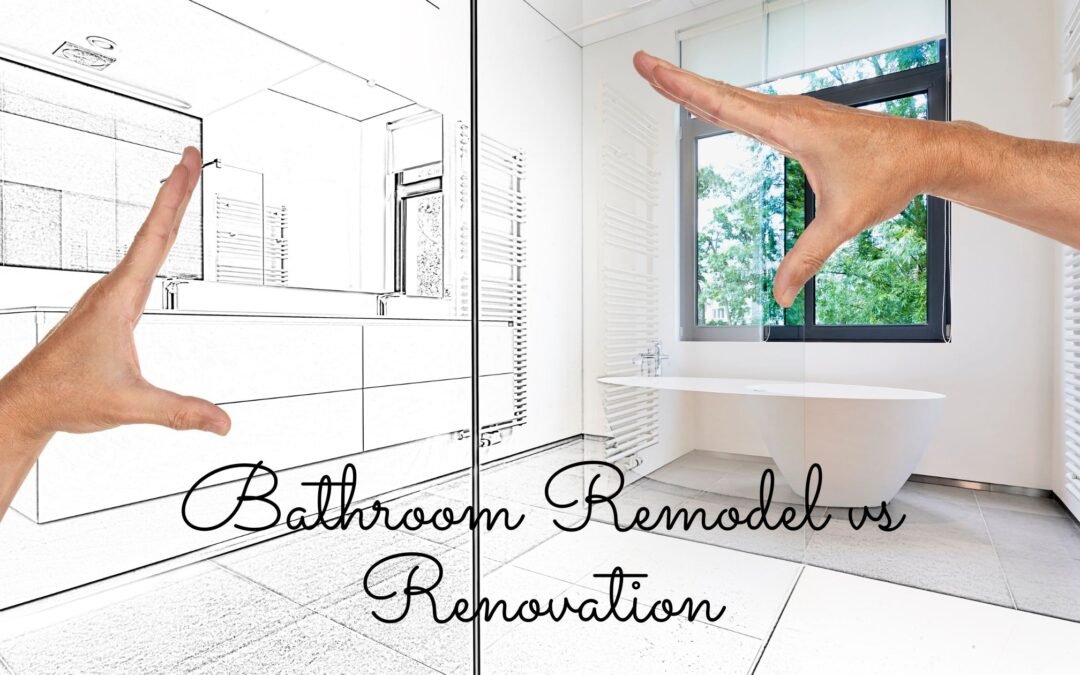When considering a bathroom upgrade, you might be thinking about the difference between a remodel and a renovation. The choice between the two could greatly impact the outcome of your project.
The main difference between bathroom remodeling and bathroom renovation is remodeling typically involves structural changes and altering the layout, while renovation focuses on updating existing features without changing the layout.
Understanding the differences will help you in deciding the best approach for your bathroom space. So, before you decide which route to take, it’s important to check the pros and cons of each carefully.
Key Differences Between a Bathroom Remodel and Renovation
When deciding between remodeling and renovating, consider the key differences. Understanding these differences is important if you want a completely new bathroom for yourself or your family.
Bathroom Remodeling:
- Involves changes to the structure and altering the layout.
- Focuses on redesigning the entire space according to your needs and preferences.
- Typically more extensive and expensive than a renovation.
- Requires permits and commitment to local building codes.
Bathroom Renovation:
- Involves updating and upgrading existing features without altering the layout.
- Improves the appearance and efficiency of your bathroom without making major changes.
- Typically takes less time and is more cost-effective than a complete remodel.
- May not require permits unless significant changes to electrical or plumbing systems are made.
Make sure to check your project goals, budget constraints, and desired outcomes before deciding to renovate your bathroom. Your safety and satisfaction are important, so choose the option that aligns best with your needs and preferences.
Also Read:
How to Hire A Bathroom Remodeling Contractor in Kansas City
Renovation Tasks and Examples
Consider the various tasks and examples linked with the bathroom renovation project to understand the scope of updating finishes and elements in your space.
Tasks may include:
- Refinishing floors
- Painting walls
- Swapping out outdated fittings for new ones
- Updating plumbing
- Installing new flooring
- Installing a new bathroom vanity, mirror, and faucet.
These tasks aim to give your bathroom a like-new look without major changes. By updating finishes like cabinets and lightning, you can create a more modern and functional environment.
The beauty of renovation is that it often allows for minor updates to be done DIY-style, making it a feasible project for many homeowners.
Remodeling Process and Tasks
To start a bathroom remodel project, begin by visualizing the desired layout and design changes for your current bathroom space. Consider where you wish to place new units like sinks, showers, or toilets. This step lays the groundwork for the entire remodeling process.
Tasks involved in remodeling include:
- Installing new unit
- Updating plumbing and electrical work to guarantee everything functions safely and efficiently
- Adding lavish features such as spa tubs, heated floors, or smart technology to enhance your bathroom experience
Cost of a Bathroom Remodeling and Renovating in Kansas City, Missouri
Bathroom Renovation
A bathroom renovation focuses on cosmetic changes and works with the existing layout, making it a cost-effective choice. Here are the estimated costs for various renovation tasks:
Estimated Costs:
- Tiling:
- Economical: $2 to $3 per sq. ft. + $5 per sq. ft. for installation.
- Standard: $5 to $10 per sq. ft. + $7 per sq. ft. for installation.
- Premium: $15 to $25 per sq. ft. + $10 per sq. ft. for installation.
- Plumbing: $1,000 to $2,000 for minor updates.
- Waterproofing: $500 to $1,000.
- Electrical Work: $100 to $200 per point.
- Sanitary ware:
- Floor-mounted commodes: $200 to $500 per piece.
- Wall-mounted commodes: $300 to $700 per piece.
Overall, bathroom renovations in Kansas City tend to average between $6,600 and $16,400.
Bathroom Remodeling
Bathroom remodeling tends to be pricier since it often includes changing the entire structure and additions to the space. Here are the estimated costs for various remodeling tasks:
Estimated Costs:
- Typical Range: $6,000 to $15,000, with an average cost of around $10,978.
- Cost by Bathroom Size and Type:
- Half-bath/powder room (20 sq ft): $12,000–$16,000.
- Three-quarter bath (35 sq ft): $21,000–$28,000.
- Full bath (50 sq ft): $30,000–$40,000.
- Primary bath (100 sq ft): $60,000–$80,000.
Major Expenses:
- Bathtub: $2,600–$4,100.
- Shower: $3,000–$4,800.
- Sink: $1,400–$2,300.
- Cabinets: $4,700–$7,000.
- Countertops: $2,800–$4,100.
- Flooring: $2,500–$3,600.
Additional Costs:
- Demolition: $500 to $2,000.
- Painting and Light Fixtures: A few hundred dollars each.
- Permits and Professional Fees: Additional costs for permits and hiring professionals.
(These are general estimates and do not apply to everyone for more correct estimates please call us at – 380-241-5278)
Permits and Regulations
Permits are generally required for remodeling projects involving plumbing or electrical work. For renovations, permits may not be necessary unless significant changes are made. Always check with the Kansas City Department of Buildings for specific requirements.
Bathroom Remodel vs Renovation – Pros and Cons
Bathroom Remodeling
Pros:
- Increased Home Value: A well-executed remodel can significantly increase your home’s value, offering a high return on investment (ROI).
- Improved Functionality: Remodeling allows you to redesign the layout and add features that enhance the bathroom’s functionality.
- Enhanced Aesthetics: You can completely transform the look and feel of your bathroom, making it more modern and appealing.
- Safety Upgrades: Addressing safety issues like mold, mildew, and outdated fixtures can make the bathroom safe.
- Energy Efficiency: Upgrading to energy-efficient fixtures can reduce utility bills and benefit the environment.
Cons:
- High Cost: Remodeling is generally expensive, with costs ranging from $6,000 to $80,000 depending on the project’s scope.
- Time-Consuming: Remodeling can take several weeks to months, causing significant disruption to your daily routine.
- Need for Permits: Changes in structure often require permits, adding to the complexity and cost of the project.
- Stress of Choosing Contractors: Finding and vetting reliable contractors can be stressful and time-consuming.
Bathroom Renovation
Pros:
- Cost-Effective: Renovations are generally less expensive than full remodels, focusing on cosmetic updates rather than structural changes.
- Quick Completion: Renovations typically take less time to complete, minimizing disruption to your daily life.
- DIY-Friendly: Many renovation tasks can be done by homeowners, saving on labor costs and allowing for personal customization.
- Improved Appearance: Simple updates like new fixtures, paint, and flooring can significantly enhance the bathroom’s appearance.
Cons:
- Limited Changes: Renovations do not address underlying structural issues or allow for significant layout changes.
- Potential for Hidden Issues: Cosmetic updates may not reveal or address hidden problems like plumbing or electrical issues.
- Lower ROI: While renovations can improve the look of your bathroom, they may not increase home value as much as a full remodel.
- Quality of DIY Work: DIY renovations can result in lower quality work if not done correctly, potentially leading to future repairs.
Return on Investment (ROI)
A well-executed bathroom remodel can offer a high ROI, often around 70%, making it a valuable home improvement project.

